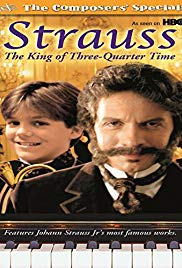Around the time that your child watches this movie, play some Strauss waltzes and tell your child what they are. Ask and answer the Quick Discussion Question. If your child is very interested in the film, go through some of the other Discussion Questions.
Johann Strauss, Sr., (1804 – 1849), the father of the musician portrayed in this film, was the great popularizer of the waltz. Developed in Vienna from the rustic dances of the Black Forest and the Danube uplands, the waltz is one of the most popular dances in the world. Johann, Sr. composed 152 waltzes and toured with his orchestra throughout Europe. He rose from an unknown bookbinder’s apprentice to be the toast of Viennese society. His abilities as a composer and performer of this beautiful dance are legendary.
Johann, Sr. left his wife and children for a mistress, spending his money on her to the detriment of his family. When it appeared that Johann, Jr. had musical talent, his mother had him secretly trained. Johann, Sr. was outraged when he discovered this and did everything he could to discourage his son’s musical career. For example, when it became known that Johann, Jr. wanted to hold his first concert, the father had his manager go to each concert hall in Vienna and warn them that if they employed his son or rented their hall to the boy, the elder Strauss would never perform there again. Given Johann Strauss Sr.’s popularity, this was a threat of economic extinction. Johann, Jr., at the age of 19, was forced to hold his first concert in the suburbs at a hall to which the manager had not yet been able to deliver the threat. Johann, Jr. was an immediate success and the rivalry between father and son continued for many years.
Johann Strauss, Jr. (1825 – 1899), the musician portrayed in this film, was as successful as his father. His compositions include: The Blue Danube, Tales from the Vienna Woods, Roses from the South and Voices of Spring. He toured Europe and America with his orchestra.


